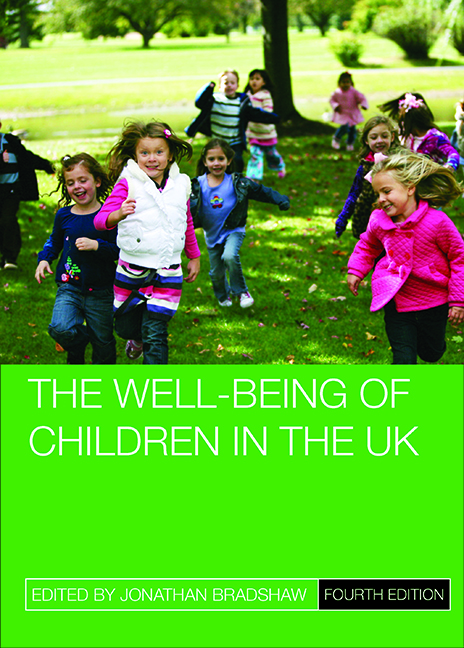Book contents
- Frontmatter
- Contents
- List of figures and tables
- List of abbreviations
- Notes on contributors
- Acknowledgements
- One Introduction
- Two Demography of childhood
- Three Child poverty and deprivation
- Four Physical health
- Five Subjective well-being and mental health
- Six Education
- Seven Housing and the environment for children
- Eight Children’s time and space
- Nine Children and young people in care and leaving care
- Ten Child maltreatment
- Eleven Childcare and early years
- Twelve Children, crime and correction
- Thirteen Conclusion
- Bibliography
- Index
Nine - Children and young people in care and leaving care
Published online by Cambridge University Press: 01 September 2022
- Frontmatter
- Contents
- List of figures and tables
- List of abbreviations
- Notes on contributors
- Acknowledgements
- One Introduction
- Two Demography of childhood
- Three Child poverty and deprivation
- Four Physical health
- Five Subjective well-being and mental health
- Six Education
- Seven Housing and the environment for children
- Eight Children’s time and space
- Nine Children and young people in care and leaving care
- Ten Child maltreatment
- Eleven Childcare and early years
- Twelve Children, crime and correction
- Thirteen Conclusion
- Bibliography
- Index
Summary
Key statistics
• In 2014, around 93,000 children and young people were being looked after by the state in the UK.
• In 2014, Scotland had the highest rate of looked-after children and England the lowest.
• During a 12-month period in 2013-14, 37,600 children and young people started to be looked after and 37,900 ceased to be looked after.
• Over 12,700 young people aged 16 and over ceased to be looked after in the UK in 2014.
• Looked-after children aged 11-15 are four to five times more likely to have mental health problems than children of the same age group living in private households.
• Looked-after children aged 10 and over in England are four times as likely to be convicted of an offence, or to be subjected to a reprimand, or final warning, than their peers.
• Looked-after children have substantially lower levels of educational attainment than other children in the population.
• Those ceasing to be looked after, compared to young people in the general population, are at substantially higher risk of not being in education, training or employment (NEET), of experiencing homelessness, and of having mental health problems as adults.
Key trends
• The numbers of children in the UK looked after at any given point has increased by almost 10,000 over the last five years. This increase has been greatest in Wales, while the numbers in Scotland remain relatively unchanged.
• There has been a decrease in the average age of children being looked after.
• There is evidence of increased educational attainment, better healthcare and lower rates of offending and substance use among looked-after children over the past five years.
Key sources
• Office for National Statistics (ONS)
• Department for Education (DfE), England
• Knowledge and Analytical Services, Welsh Government
• Education Analytical Services, Scottish Government
• Department of Health, Social Services and Public Safety (DHSSPS), Northern Ireland
Introduction
At the end of March 2014 around 93,000 children were in ‘public care’ in the UK. In all four countries of the UK official policy aims to improve the well-being of these children, and to help those young people who leave the care system in their often difficult transition to adulthood.
- Type
- Chapter
- Information
- The well-being of children in the UK (4th edition) , pp. 231 - 262Publisher: Bristol University PressPrint publication year: 2011



